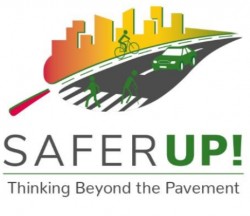Imagining a new life for the street: improving public spaces and bringing innovation to the ground below us
Why on earth should people get excited about pavements?! Urban pavements are where we walk, ride, sit, stop to talk with friends and interact with numerous other modes of transport around us – notably significant car traffic. We use them every day to get from home to work, school, the gym or the cinema and back home. Pavements are essential to getting around and in a safe environment, but have changed little and suffer from a lack of imagination. New technologies for mobile phones and cars are released everyday, why should this not be the case also for pavements? Safety, accessibility, durability, smartness and sustainability should be the keywords of today’s research on urban pavements in order to have them keeping pace with other vital spaces and technologies we deal with in our lives. Our project – SAFERUP! – takes into account all these aspects and provides 15 ‘Early Stage Researcher (ESRs)’ PhD training programmes. These new professionals will be a focal point between academia and industry: ready to deliver these solutions on time and in the right place. What are some of the biggest challenges and how does SAFERUP! Plan to address them? SAFERUP! aims to contribute to more liveable cities. We are really working to transform a vital public space and bring innovation to the very ground below us. This means we approach topics like energy harvesting from roads, where the pavement itself will be a source of alternative energy. Similarly, a road that can be easily and quickly repaired on a regular basis will reduce the need of major maintenance and traffic disruptions. I think that SAFERUP! also pays a great amount of attention to vulnerable users, trying to find ways to make pavements safer for pedestrians – especially the disabled, elderly and cyclists. Materials with superior skid resistance performance, or that reduce the risk of injuries from inevitable falls for instance. On the other hand we aim at reducing falls with pavements that have de-icing elements or reducing the ‘heat island’ effect by reducing the heat coming from the walking surface. From a sustainability point of view there is also a lot to say. One hundred percent recycling of pavements and bioremediation of wash off waters are among the key elements we will look at. Along with them, flood-mitigating porous pavement, waste recycling for acoustic pavements and the life-cycle cost analysis of proposed solutions will be studied together with the partner companies and consultants. Describe some of the innovative outputs you might be expecting from your Early Stage Researcher and industry partnerships… Well, as coordinator I should be impartial, but I think that some of the projects have very strong potential for releasing innovative and ready-to-market solutions for our urban pavements. We should keep in mind that SAFERUP! is a training-through-research project which, first of all, aims at forging new professionals on topics that are now seen mainly as research fields. I am pretty sure that some of the ESRs will end up working in the project companies, institutions or some of the supporting partners. It’s a very interactive and communicative approach. If you want your research to get known you should engage the public and this multiplies the interactions and the benefits from the final output of the project. Researchers will also have connections with other projects outside SAFERUP! and this will help them make the most of their inter-sector and multidisciplinary experience. Interested Early Stage Researcher candidates should consult the project website and submit their applications by 9 July 2018.
Keywords
Countries
Austria, Australia, Belgium, China, Germany, Spain, France, Italy, South Korea, Latvia, United Kingdom, United States



